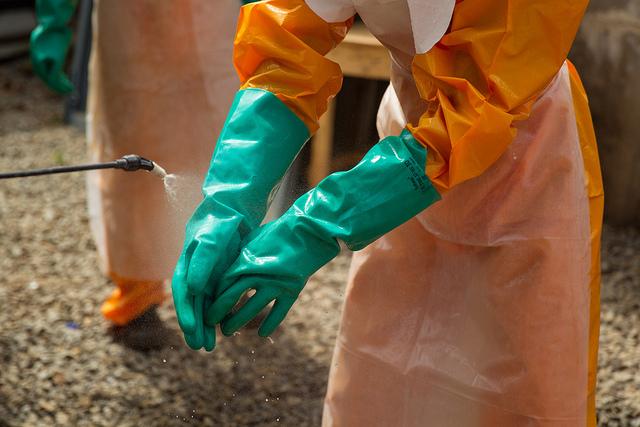For the fifth week in a row, three Ebola cases were confirmed in West Africa's outbreak region, limited to two in Guinea and an earlier announced case in Sierra Leone that set back the clock on its progress toward Ebola-free status.
In its weekly epidemiologic update today, the World Health Organization (WHO) said that a rapid response team has been deployed to Kambia district where Sierra Leone's recent case was detected, and teams are on alert to tamp down the threat of recent high-risk cases in Guinea.
In other developments, global health experts in London today grappled with how to better manage global health risks, in the wake of missteps that occurred during the response to the Ebola crisis.
Case details, response status
Both of Guinea's cases were detected in Conakry, though one had links to Dubreka, located on the outskirts of the country's capital, the WHO said. Both cases were identified in Conakry's Ratoma area, where several of the country's past cases have been confirmed.
One case involves a 9-month-old baby girl who died from her infection. The girl, who was not a registered contact, got sick in Dubreka and was taken to Conakry, where she died before she could be admitted to an Ebola treatment center. The other is a 56-year-old man who was a registered contact of a previous case.
The WHO said the number of contacts being monitored in Guinea continues to drop and is now at about 450, compared with 600 the week before.
Sierra Leone's only case-patient was announced by the country's health ministry on Aug 30, a 67-year-old woman who died in the community. Kambia district hadn't had a confirmed Ebola case in 50 days, and officials took extra steps to verify the positive findings.
The case detection also triggered an extension of Guinea's ring vaccination trial into Sierra Leone, with the VSV-EBOV vaccine offered to the woman's contacts. Use of the Canadian-developed vaccine has been expanded after a phase 3 trial suggested that it was highly effective.
The WHO said the woman was treated in the community before she died and that 48 contacts have been identified for monitoring, a number that is expected to rise. It added that the source of the woman's illness is under investigation.
No new health worker infections were reported last week, keeping the total at 881, including 513 deaths.
Overall, West Africa's number of confirmed, suspected, and probable Ebola cases is at 28,073 cases, which includes 11,290 deaths.
Task force tackles IHR issues
An Institute of Medicine (IOM) task force to explore problems and challenges with governance related to global health threats, namely the International Health Regulations (IHRs), met yesterday and today in London at Wellcome Trust headquarters. The group aired its 2-day deliberations live on a webcast.
The IOM discussions are one of several global efforts to review the response to health emergencies in the wake of the Ebola outbreak. Last week a WHO committee set up to review how the IHRs performed during the Ebola epidemic met for the first time. The committee will deliver its final report to the World Health Assembly next May.
One goal of the IOM presentations and talks is to clarify responsibilities for surveillance, detection, and reporting of infectious disease outbreaks, who is responsible for deploying response resources, and if existing legal tools are enough to address emerging outbreaks.
The IOM task force on governance is part of a bigger National Academy of Medicine (NAM) effort to hammer out a global health risk framework. The effort will include three other IOM workshops to cover financing the response to pandemic health threats, building resilient health systems, and research and development of medical products.
Margaret Chan, MD, MPH, the WHO's director-general, addressed the IOM group yesterday during the first day of its meeting. She said it is difficult for countries, such as the ones in West Africa, that experience other major disease threats such as malaria, Lassa fever, and cholera to recognize an unusual event in the midst of all the "background noise" from diseases with similar symptoms.
She acknowledges several IHR weaknesses, including country compliance with core-building capacities, countries imposing travel and trade restrictions that went beyond emergency committee recommendations, and lack of an intermediate alert level.
Barriers for a better global response center around absent or weak detection and response capacities and tensions between sovereign rights and global solidarity against a shared health threat, she said. "A disease like Ebola will expose every gap in health system capacity and exploit every opportunity opened by these gaps."
She said the WHO and the United Nations (UN) have used informal triggers for deploying resources in response activities but added that the arrangements can be formalized.
"Triggers can be more precisely defined, so that UN assets kick in quickly. This is one proposal for strengthening global governance for health that can move forward rapidly," Chan said.
See also:
Sep 2 WHO situation update
Sep 1 WHO text of Margaret Chan speech


















